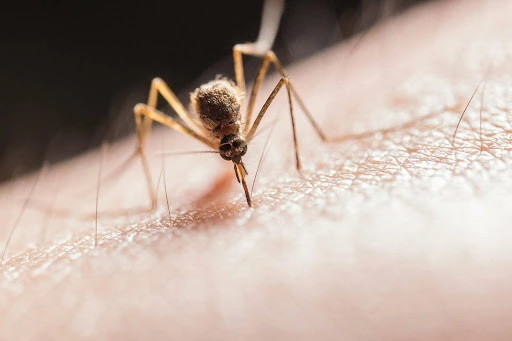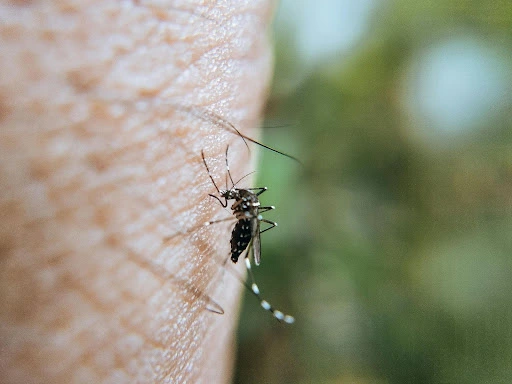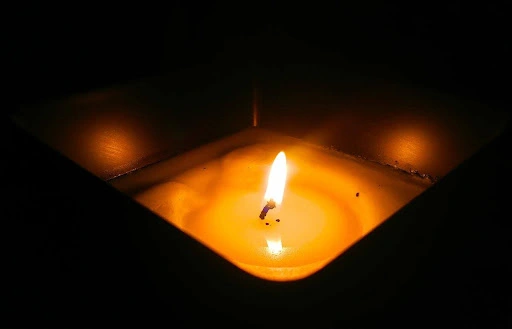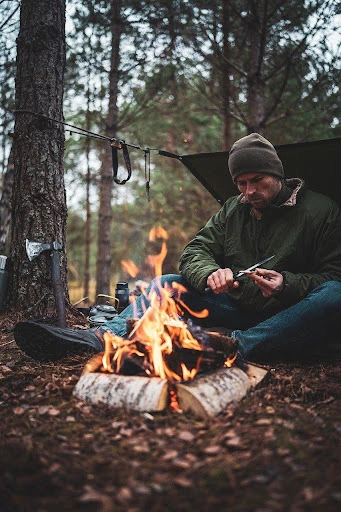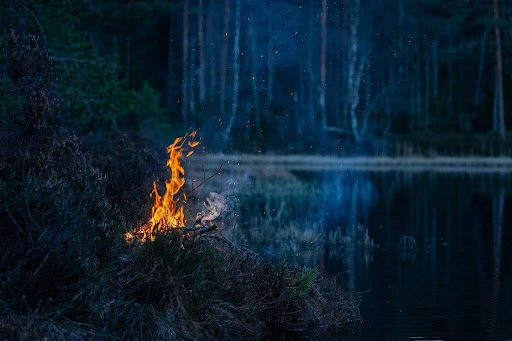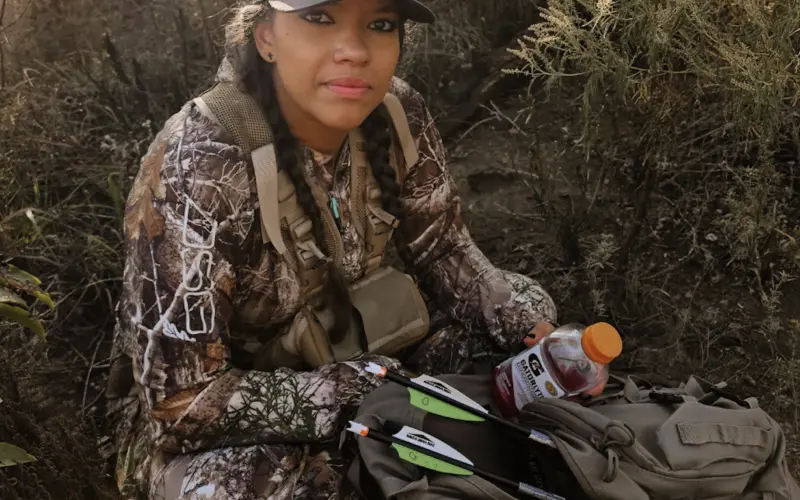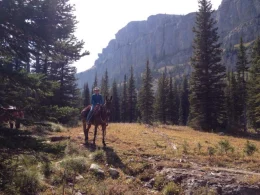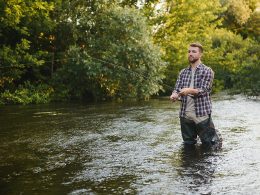When I first started camping under the stars, surrounded by nature’s beauty, I thought to myself—what could be better?
And then a tiny, but recognizable buzz wanders into my ear and with it, come the uninvited guests. Yep, mosquitoes and blackflies are the tiny terrors that can turn a dreamy camping trip into an itchy nightmare.
If you’ve been camping during the summer then you’re no stranger to these small but annoying insects. I hope that this article becomes your survival guide to outsmart these pests. From pre-trip preparations to post-camping care, we’ve got you covered.
Table of Contents
Mosquitoes and Blackflies – What Are They?
Before jumping into countermeasures, let’s get to know our enemies better. Mosquitoes and blackflies may be small, but their impact can be significant.
Mosquitoes thrive in warm, moist environments and are notorious for their itchy bites. They can also spread diseases like West Nile virus and Zika. Blackflies, on the other hand, love fast-moving water and wooded areas. Their bites may not be as dangerous, but they can cause severe itching and swelling.
Both types of insects have specialized feeding habits. Female mosquitoes need blood to develop their eggs, whereas blackflies are attracted to carbon dioxide and body heat. Knowing their habits and habitats can help us better plan against them.
For example, these biters tend to bug you at different times of the day and year. Blackflies are most prominent in late spring and late summer as the climate can be a bit wetter and cooler. You’ll find that they are active at the twilight hours but can be found during the day as well, in heavily wooded areas.
Mosquitoes start in early summer and persist right into the fall, avoiding the direct sunlight and coming out at the twilight hours instead… when we are all trying to enjoy our evenings/mornings.
Protecting Yourself: Pre-Camping Preparation
Choosing the right camping spot can significantly reduce your interaction with these pests. Aim for higher ground with good airflow; mosquitoes are weak fliers and often stick close to stagnant water. Avoid camping near lakes, ponds, or slow-moving rivers, especially if the area is heavily shaded.
Do you love that cedar or coniferous forest for its peaceful vibes? Well, these trees like shallow and acidic soil, meaning they grow near wetlands, specifically swamps. Swamps are a prolific breeding ground for insects like these. You’ll have to tweak your way of thinking a little to avoid the little buggers.
Camping in these areas is doable, but you will get significant attention from the bugs. Rocky areas are also breeding grounds for these insects as the water from rain pools sits for days, providing the best opportunity for them to spawn.
Timing also matters. If possible, plan your trips for late summer or early fall when mosquito populations start to decline. Blackflies are most active from late spring to early summer, so planning around their peak times can save you a lot of trouble.
Your best friends during these times will be dragonflies. They are voracious eaters who will patrol the skies around you, gobbling up any errant mosquito as it looks for its next meal.
Gear Up: What You Need
The right gear can make all the difference in your fight against mosquitoes and blackflies. Start with a good insect repellent. DEET-based sprays are among the most effective, but there are also natural options like lemon eucalyptus oil if you prefer. Citronella candles can add a layer of protection; you can place them around your camp to create a mosquito-free zone.
Thermacells are another excellent option for repelling insects. These portable devices create a 15-foot barrier against mosquitoes, making them perfect for outdoor settings.
If you’re going deep into the woods, consider investing in bug-proof clothing. Lightweight, breathable fabrics treated with insect repellent can offer full-body protection. Additionally, mesh bug suits are also commonly sold and they provide enough of a buffer to protect you from any proboscis or hungry bug mouth.
Mesh shelters and tents are also indispensable, in my experience. Choose tents with fine mesh to keep even the tiniest bugs out. Also, prepare to have a tarp to protect the shelter against rain as bug shelters are not known for repelling rain.
For hammock campers, look for models with integrated bug nets and thicker fabric on the bottom (these suckers can get you through the bottom).
In-Camp Strategies
Once you’ve set up camp, some strategies can help keep these pests at bay. First, establish a smokey fire. Adding leaves to your fire can create smoke that mosquitoes despise. Set up your camp in a breezy area if possible; both mosquitoes and blackflies struggle in windy conditions. This can be achieved if you are camping near a lake with a strong wind.
Timing your activities can also reduce exposure. Avoid being outside a couple of hours after sunset and just after sunrise. These are peak times for mosquito activity, so having some form of protection during these periods is crucial.
Another tactic is to minimize light sources. Mosquitoes are attracted to light, so keep your campsite as dark as possible after dusk. Use a headlamp with a red light setting to avoid attracting them. I mean, you could also set up a bait lamp that attracts most of them, but it only works for so long.
Post-Camping: Dealing with Bites and Stings
Despite all precautions, bites might still happen. Knowing how to treat them can make a huge difference. For immediate relief, apply a cold compress to reduce swelling. Baking soda paste can neutralize the itchiness, simply mix a tablespoon of baking soda with enough water to make a paste (a drop or 2) and apply. If you don’t fancy the DIY solution, calamine lotion is a store-bought product that soothes the skin.
Natural remedies also work wonders. For example, Jewelweed (Spotted Forget-Me-Not) is a great plant that can be turned into a salve for bug bites.
A hot shower can provide temporary relief while jumping into a lake can help reduce swelling and itching. Over-the-counter antihistamines can be effective for more severe reactions.
If you absolutely MUST itch the bite, try not to go at it until you bleed. A common trick is to take your fingernail and press an “X” into the bug bite, this will relieve the itching without breaking the skin.
If you notice any signs of infection (redness, pus, or increased pain), consult a healthcare professional. It’s rare, but some bites can lead to complications requiring medical treatment.
Final Thoughts
Camping is one of the ultimate ways to connect with nature, but mosquitoes and blackflies can put a damper on the experience. By understanding these pests and taking proactive steps, you can enjoy the great outdoors without the itch.
Remember these key points:
- Choose your camping spot wisely.
- Gear up with the right equipment.
- Use effective in-camp strategies.
- Treat bites promptly.
Don’t let a few bugs ruin your adventure. I live outside most of the year and they haven’t dampened my love for the outdoors.

